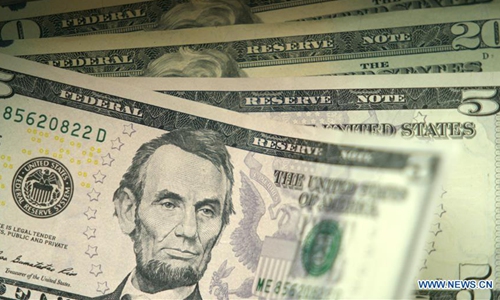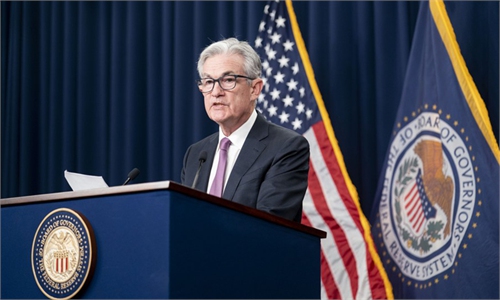US Fed hikes interest rates by 75 basis points, triggering risk of domestic recession

Photo taken on March 3, 2020 shows US dollar banknotes in Washington D.C., the United States.(Xinhua/Liu Jie)
The US Federal Reserve on Wednesday raised its benchmark interest rate by 75 basis points, in line with market expectation. This marks a second interest hike in a row of that magnitude, as it races to tame inflation running at a four-decade high.
Experts said that the aggressive rate hikes won’t solve the woes of US economy but could lead to a possible US recession and put the global economy at risk.
The 75 basis points hike matched the magnitude of the Fed's last move in June meeting, which was its largest single-meeting rate increase since 1994. The Fed previously raised rates by 25 basis points in March and then by 50 basis points in May.
"Inflation remains elevated, reflecting supply and demand imbalances related to the pandemic, higher food and energy prices, and broader price pressures," the Fed said in a statement after a two-day policy meeting, adding that the central bank is "highly attentive to inflation risks,” Xinhua News Agency reported.
The Fed's interest rate increase should alleviate inflation to some extent but with limited impact, as it is rooted by geopolitical conflicts, Dong Dengxin, director of the Finance and Securities Institute of the Wuhan University of Science and Technology, told the Global Times on Thursday.
“The Fed's interest rate hike cannot fundamentally solve inflation as the main cause of current inflation is caused by the energy supply shortage under the conflict between Russia and Ukraine and worsened by its suppression on China, the world's largest manufacturing country, with additional tariff on Chinese imports,” Dong said.
US’ headline consumer price index (CPI) has remained over 8 percent since March this year. The US consumer price in June surged 9.1 percent from a year ago, hitting a fresh four-decade high, despite its previous interest hikes in the year.
In a press conference Wednesday afternoon, Fed Chairman Jerome Powell left the door open for another "unusually large increase" at its next meeting in September, but noted that would depend on upcoming economic data, Xinhua reported.
Given historical inflation in the US and the Fed’s 2-percent inflation goal, it’s widely expected that the Fed will continue to hike interest rates by 50 basis points in September, Wan Zhe, an economist and professor at the Belt and Road School of Beijing Normal University, told the Global Times on Thursday.
However, the frequent interest rate hikes are expected to suppress its economic vitality, putting it at the edge of a recession, experts warned.
The sizable financial tightening will probably send the US economy into technical recession in the near future and economic recession may appear in 2023, Wan said.
The US economy is estimated to have shrunk at an annual rate of 1.2 percent in the second quarter, according to the Federal Reserve Bank of Atlanta's GDPNow model updated Wednesday.
With a first-quarter decline of 1.6 percent, a second consecutive quarter of negative growth would meet the technical definition of a recession.
A US recession is almost inevitable due to its economic structure vulnerabilities, Dong Shaopeng, an expert advisor at the China Securities Regulatory Commission, told the Global Times on Thursday, noting that a long-term hollowing out in US manufacturing and increasing protectionism policies cannot support its sustainable economic growth.
The drastic turn in US monetary policies will also bring about negative economic consequences to the world, experts warned.
Wan said the US’ move of increasing interest rates to achieve “soft landing” has spillover effects on emerging economies and areas like the EU.
Due to the dominant role of US dollar in global settlement, the US’ selfish move has forced many developing economies to follow suit in conducting premature financial tightening so as to contain the risk of capital outflows, placing their own domestic economic growth at risk, experts noted.
The rate rise itself creates a cash flow back to the US, drawing capitals from other countries. Higher interest rates will also dampen the vitality of the US economy and reduce its commercial spillovers effect, hurting exports from other countries to the US, Bai Ming, deputy director of the International Market Research Institute at the Chinese Academy of International Trade and Economic Cooperation, told the Global Times on Thursday.
Compared with other developing countries and EU countries, China is less dependent on energy imports and therefore is less affected by imported inflation risks, experts said.
China's June CPI rose 2.5 percent year-on-year, unchanged month-on-month, still generally moderate, according to data from the National Bureau of Statistics (NBS).
“It is expected that China’s monetary policy operations will focus more to the internal demand of economic development, with a prudent monetary policy,” Bai said.

